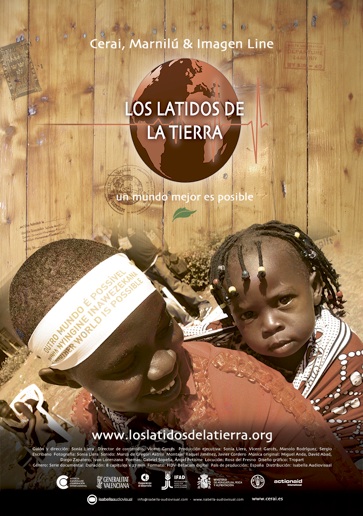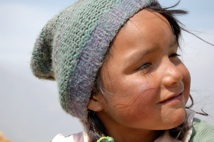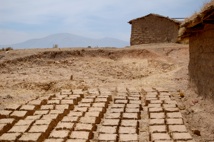A better world is possible


The series “The Beats of the Land” was born of the social alliance between the production companies Marnilú Audiovisuales, Imagen Line and the Spanish NGO CERAI (Centro de Estudios Rurales y de Agricultura International).
Filming has taken place in Hong Kong, Turkey, Italy, Greece, Letonia, Venezuela, Chile, Brazil, Bolivia, Marrocco, Algeria, Kenya and Spain, countries which have sponsored significant encounters (World Forums and related conferences) organised by civil socierty.
The series will be completed in February 2007 with all eight episodes ready for broadcasting.
COLLABORATION
THE PRODUCTION


CREDITS
Script :
Sonia Llera
Direction:
Sonia Llera
Contents Direction:
Vicente Garcés
Executive Production:
Sonia Llera
Vicente Garcés Manolo
Rodríguez Segio Escribano
Photography:
Sonia Llera

LINKS
Editing:
Raquel Gimenez
Javier Cordero
Sound:
Marco de Gregori Astrisi
Original Music:
Miguel Anda
David Abad
Diego Zapatero
Ivan Lorenzana
Poets:
Gabriel Sopeña
Ángel Petisme
Locution:
Rosa del Fresno
Web design:
Marcela Pelegrín
Translatios:
Frank Hodgkins
Genre :
Documentary
Running time:
8 chapters x 27 min.
Country : Spain
Format: HDV-betacam dígital
ONG CERAI



BACKGROUND: THE FIRST PHASE
Between April 2005 and February 2007, the eight episodes of The Beats of the Land were filmed. From March to July 2007, all episodes were edited in Spanish and English. The series is divided into eight episodes lasting 26 minutes each and they are structured visually and narratively to combine testimony from several farming community members as well as analysis from international experts and commentary from social leaders.
The series aims to show the reality of small-scale farmers worldwide while proposing solidarity-based alternatives in order to make progress in the fight against poverty and hunger and create a better world.
The series’ ideas are based on a few fundamental principles: the right of communities to create their own sustainable policies; to consider genetic resources as patrimony of all humanity; giving priority to small-scale ecological family farming; to guarantee fair pricing for production; increasing public investment to encourage family farming; to recognise and promote the role of women in food production.
We value the audiovisual medium as an ideal vehicle for the spreading of ideas. As such we aim to capture media space and offer a documentary archive which also shows the work and effort of various organizations involved in the fight against world poverty and hunger.


2.- OBJECTIVES
The project’s general objective is to make society sensitive to the complex reality of rural societies in the world, particularly in the developing world, and in all its magnitude. The specific objective is to show society, via an audiovisual documentary series, the crude reality in which rural society lives, but with a hope-filled perspective, aiming to spark interest in the creation of a solidarity-based alternative for the building of a better future and a better world.
It is a project which gives a voice to fair social demands, to activities and initiatives carried out by distinct sectors of civil society (farmer organisations, women’s organisations, fishing organisations, artistic groups, etc.) from different parts of the world, sectors which often suffer from exclusion and media silence. It also covers institutional initiatives which are currently being carried out.
The series also has a gender-based focus. Hence its first episode provides an analysis of the fundamental role which women have historically held in the rural world; the enormous difficulties which they confront in terms of access to land property and productive resources; and, paradoxically, their essential role in food production, in food culture, and in sustaining the family economy..
THE AUTHORS
THE CERAI
The Centre for International Rural and Agriculture Studies (Centro de Estudios Rurales y de Agricultura Internacional - CERAI) has consolidated experience in organising and participating in international events related to problems which exist at a worldwide level and are causes of hunger, poverty and malnutrition.
In 2001, CERAI participated in various workshops and seminars on Agrarian Reform and Food Sovereignty at the World Social Forum of Porto Alegre, Brazil. That same year, CERAI occupied the Presidency of the International Organising Committee for the World Forum on Food Sovereignty held in September in La Havana, Cuba.
In 2003, 2004, 2005 and 2006, CERAI participated in the European Social Forums held in Florence, Paris, London and Athens, organising workshops on food related topics in Europe.
CERAI was present at the World Food Summit organised by the FAO in Rome in 2002; at the WTO Conferences held in Cancun (September 2003) and Hong Kong (December 2005); and at the World Social Forum of Mumbai, India, in 2004. At all of these events, CERAI participated in the workshops, seminars and conferences on Agrarian Reform and Food Sovereignty.
In December 2004, CERAI organised, with the help of 14 NGOs and farmer organisations, the World Social Forum on Agrarian Reform in Valencia, Spain, at which participated representatives of more than 200 organisations of farmers, agricultural workers, women, indigenous peoples, human rights organisations, NGOs, academic institutions and public institutions, from over 70 countries.
CERAI was also present at the World Social Forums of Porto Alegre, Brazil (January 2005), Caracas, Venezuela (January 2006) and most recently, of Nairobi, Kenya (January 2007).
CERAI participated in the FAO’s regional European meetings in Montpellier, France (2004) and Riga, Latvia (2006).
CERAI predominantly focuses on two geographical areas: Mediterranean basin countries and Latin America. It is presently involved in rural development cooperation projects in Morocco, Algeria, The Palestinian Territories, Panama, The Dominican Republic, Cuba, Colombia, Bolivia and Argentina.











